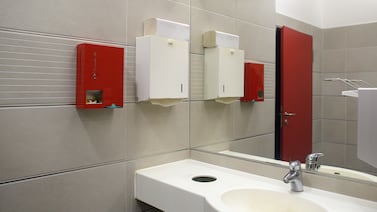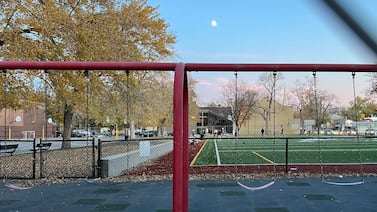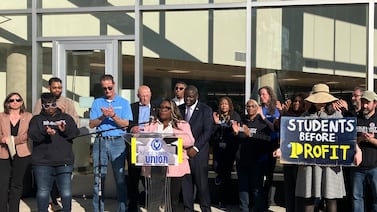Sign up for Chalkbeat Newark’s free newsletter to keep up with the city’s public school system.
It was an exciting morning for Rachel, a fourth grader at Franklin Elementary School, who was eager to help her younger brother Romeo navigate his first day of pre-K on Tuesday.
“Lightning McQueen!” said Romeo, turning around to show off his backpack decorated with the character from the Disney movie “Cars.”
“I’m his big sister, and he’s my little brother,” Rachel said, as she held Romeo’s hand and twirled her purple lunch box emblazoned with hearts.
Around the corner, a small crowd gathered outside the school’s playground, where parents snagged quick pictures of their children before they made their way into the building. Principal Robert Spat, starting his first year leading the school, stood outside wearing a blue cape and greeting students and parents with the help of a staff member in a brown eagle costume, the school’s mascot.
Superintendent Roger León was also there to greet Franklin Elementary students, who were among the nearly 40,000 Newark Public Schools students who returned to classrooms on Tuesday.
“Good morning, buenos días,” said León, a child of Cuban immigrants, as he welcomed Spanish-speaking students and parents.
Franklin Elementary is one of 14 elementary schools in the North Ward where students receive bilingual instruction. At Franklin’s bilingual program, the largest in the district, the majority of students come from homes where Spanish is their first language.
The number of English learners is growing – to just over 11,000 students districtwide this year, 822 more than last year. The district is also home to another 7,000 students with disabilities who, along with English language learners, are considered vulnerable students in need of support services and classroom resources.
“I don’t see it as a challenge, I see it as an opportunity,” said León after visiting classrooms at Franklin Elementary, referring to providing support for English language learners and students with disabilities. Vulnerable students make up just under half of the district’s enrollment this school year.
District leaders are also facing the end of $287 million in federal COVID-19 relief funds this school year that helped boost tutoring programs and expand summer programming. In addition, families are also adjusting to a new school day routine.
This year, all Newark public school students are expected to arrive at school by 8:15 a.m. under a new universal schedule that was part of an agreement between the Newark Teachers Union and the district. The new schedule extends the school day, allowing for more instruction time and an extra 30 hours of tutoring for elementary students during the day per year, according to the district. The change also means elementary students must arrive at school 10 minutes earlier than last year and high school students are dismissed 25 minutes later than last year.
On Tuesday, some parents and students ran to the front of Franklin Elementary after the bell rang at 8:15 a.m. Jaymie Paola, the mother of a first grader at Franklin, said she made sure her son went to bed early so he could wake up on time. Others like Claudia Ramos said they had a hard time waking up their students for school.
The 2024-25 school year marks the fifth year of León’s 10-year strategy, known as “The Next Decade: 2020-30,” an ambitious plan aimed at tackling learning loss, implementing new curriculums, scaling up tutoring efforts, addressing emerging issues, and adding more teachers, among other goals.
School leaders must also address a host of concerns such as improving schools, supporting the growing number of vulnerable students, raising attendance, supporting academic recovery efforts, and assessing the effects of anti-Blackness in schools following concerns of racial harassment at a city high school. The district is expanding AI technology to support teachers in the classroom and keep students safe following shooting incidents outside two high schools last year.
This spring, the Newark school board approved a $1.5 billion budget that included a $6.8 million increase in tutoring efforts previously covered by American Rescue Plan dollars – a one-time payment to school districts across the country as part of the federal government’s three-part relief package to help schools respond to the pandemic.
León visits district schools with new leaders
On Tuesday morning, in addition to his stop at Franklin, León visited three other North Ward schools with new principals: Salomé Ureña, First Avenue, and Branch Brook Elementary School.
At Salomé Ureña, León visited Mrs. Ramos’ bilingual kindergarten classroom as “Remember Me” from the Disney movie “Coco” played in the background. Students in the classroom sat on a colorful rug as they listened to their teacher read “Una carta de tu maestra,” or “A letter from your teacher,” a book that helps educators welcome students on their first day of school.
León also visited two eighth grade classrooms, including one equipped with two air conditioners as part of the district’s ongoing efforts to install the units in classrooms following concerns about hot temperatures at the start of each school year. In late August, the district said it had installed nearly 900 air conditioners with more on the way.
This year, students will also see contactless water fountains in their schools. During August’s school board meeting, the district reported that 79 contactless water fountains out of 843 remained to be installed. The district will continue to install the contactless water fountains this year, a $5 million project funded through COVID relief dollars that began in 2022.
At First Avenue Elementary, León spoke with the school’s entire eighth grade class and asked about their plans for high school, in anticipation of the enrollment application for the next school year opening on Nov. 2. One student said they wanted to go to Science Park, León’s alma mater. Others said they wanted to attend Newark Vocational and Arts High School.
León finished his chat by motivating students to accomplish their goals. “The superintendent’s job is to make all dreams of all students real,” he said.
León also visited the new Branch Brook Elementary School, formerly known as ECC-North, which welcomed 48 pre-K to second grade students with disabilities on Tuesday. The school will expand one grade level next year. The new building is equipped with a sensory room and designated quiet areas for speech, physical, and occupational therapies, said Cristina Pennetti, the school’s new principal, on Tuesday. Inside classrooms, students played with toys while others listened as their teacher read a book to them.
Newark continues academic recovery efforts for students
As Newark students returned to class on Tuesday, officials hoped summer initiatives such as high-dosage tutoring aimed at helping those who have fallen behind will improve student performance this school year. León has said federal COVID relief dollars were the district’s “saving grace” in expanding summer programs to 16 elementary schools this year, up from 14 last summer, and across 10 high schools. The district also extended summer enrichment programs – which were provided by teachers and community-based organizations – to 6 p.m. over the summer.
After-school tutoring starts on the first day of school, León said during August’s school board meeting. Saturday school for high school juniors preparing for the New Jersey Graduation Proficiency Assessment begins in December and, for a second year in a row, Saturday school will be offered to elementary students in grades 3 to 8 beginning in January in preparation for the New Jersey Student Learning Assessments.
Spring 2024 NJSLA scores are embargoed by the state, but spring 2023 test results showed district third graders didn’t see improvements in reading from the year prior. Overall, the district’s state test scores went up by 2 percentage points in both math and English language arts in 2023 but point to students’ slow recovery after the pandemic.
In addition to tutoring, León said lowering the district’s chronic absenteeism rate, which reached 12.1% last school year, down from 12.7% in 2022-23, is one of his top priorities this school year.
In addition to new principals, the district also hired 402 new teachers and at least 14 new special education teachers, 10 new bilingual education teachers, and three educators teaching English as a second language. Every year, the district faces challenges in recruiting special education and bilingual teachers but this year nearly half of the district’s enrollment consists of vulnerable students.
During the August school board meeting, the district reported 197 instructional vacancies. For this upcoming school year, the district created 338 new positions, the district reported.
Before school began at Franklin Elementary on Tuesday, Romeo and Rachel posed for their mom, Sylvana Lopez, in front of a banner that hung outside of the building. They only had 15 minutes before classes were set to start, but Lopez wanted to remember the pair’s first day of school and their excitement before heading inside.
Jessie Gómez is a reporter for Chalkbeat Newark, covering public education in the city. Contact Jessie at jgomez@chalkbeat.org.





